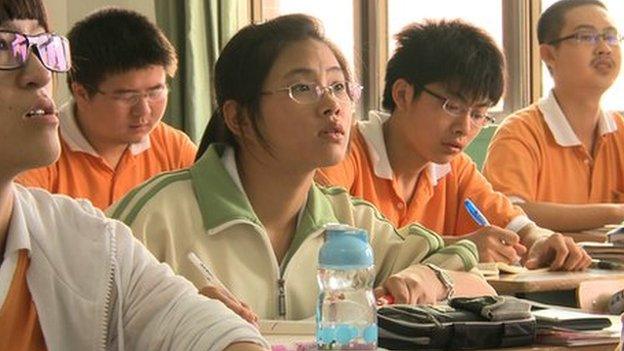China media: University entrance exam
- Published

More than nine million students are expected to take the university entrance exam in 2014
Media shine a spotlight on China's notoriously tough university entrance exam as millions of students prepare for the two-day test.
The national college entrance exam, known as the "Gaokao", will start on Saturday.
Students, along with their parents, feel intense pressure at this time of the year because success in this exam allows them to enter prestigious colleges, papers say.
The Beijing Times, external report that metal detectors will be used at examination centres to prevent students from cheating. Police officials have also been deployed to deal with "sudden incidents" of cheating, it adds.
Noting the huge pressure faced by the students, an article in the Hubei Daily, external describes the examination as a unique "growing up ceremony", but it also urges society "not to treat it as a war against the enemy".
According to a College Enrolment Report released by Education Online, external, the number of students taking the Gaokao this year is close to 9.4 million, which marks a slight increase after falling for five consecutive years since 2008.
Despite the marginal increase this year, papers are still worried over the falling numbers.
Chen Zhiwen, chief editor of the Education Online, attributes the falling number of students to the decline in China's birth rate, the People's Daily, external says.
An article in the 21st Century Business Herald, external notes that in addition to the falling birth-rate, some students' desire to study abroad has also contributed to the decline.
Amid a backdrop of pressure and the decline in numbers, a commentary in the Beijing News, external suggests a change in the current centralised college admission system.
It calls for a direct school admission system with colleges having more autonomy in their assessment methods instead of solely relying on the gaokao results.
China-Arab ties
Moving on to other news, media analyse China-Arab relations as President Xi Jinping urges better co-operation with the Arab world.
Mr Xi outlined a blueprint for greater co-operation with Arab states on Thursday at the sixth ministerial conference of the China-Arab States Co-operation Forum (CASCF) held in Beijing.
The China Daily, external says that "the potential for Sino-Arab collaboration goes far beyond energy deals".
It notes that infrastructure construction, trade, nuclear energy, space and satellite industries have been included in the blueprint.
"Besides proposed consultations about a free-trade zone and Arab participation in the Asian Infrastructure Investment Bank, Mr Xi's blueprint also took into account personnel training and art exchanges. Such efforts will put relations on a broader and more solid basis," it says.
An Huihou, China's former ambassador to Egypt, tells the Beijing News, external that Arab countries have started "looking east" during the last 10 years as "the centre of international politics and economic have shifted" from the West to Asia Pacific.
"Washington's Middle East policies are unpopular and have hurt the interests of the Arab nations. Arab nations are also attracted by China's high growth. China-Arab friendly co-operation is beneficial to both parties," he says.
BBC Monitoring, external reports and analyses news from TV, radio, web and print media around the world. For more reports from BBC Monitoring, click here. You can follow BBC Monitoring on Twitter, external and Facebook, external.